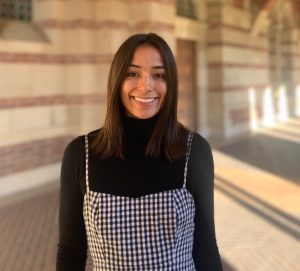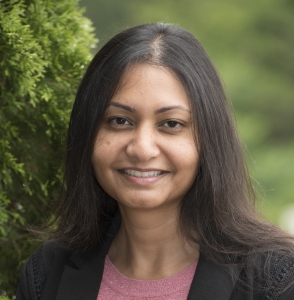Over the years, the Undergraduate Research Centers have served thousands of students. Because of the experiences, skills and mentorship they received, students have been well prepared for graduate school, further research opportunities and a variety of careers. Below we hear a few stories from alumni and friends about how the URCs have impacted their lives.
Tori Crisostomo-Rickman
Q&A
How has research and the URSP program impacted your undergraduate experience? What has the journey been like for you?
Research and the URSP program have allowed me to immerse myself within my community at UCLA and the greater Los Angeles Area. Through research, I’ve been able to draw on UCLA’s large network and form impactful relationships with my faculty mentor, local nonprofits, and undergraduate peers. When I first came to UCLA, I had little knowledge of what undergraduate research even entailed. As I took more and more courses across disciplines, I became equipped with a range of research skills to the point that I now spearhead an independent project of my own.
Share what you are currently researching.
My current research partners with a local nonprofit, the Gailen and Cathy Reevers Center, to examine food disparities and create strategies for expanding community access to fresh food in South LA. I’m using GIS and mapping to identify fresh food resources like farmers’ markets, local markets, and chain grocery stores. I’m trying to understand what factors may prevent community members from accessing these resources and what local organizations can do to make fresh food resources more accessible.
What have you learned from researching and how have the URCs supported you?
I’ve learned a lot about teamwork and community engagement from researching. Because my research is community-partnered, I’ve had to learn how to work with people from diverse backgrounds and how to balance the needs of various stakeholders. The URCs have supported me by providing me with a support structure I can draw on in times when I am overwhelmed, confused, or simply don’t know what to do. My mentor and the team at URSP HASS have helped guide me back to my research in times when I have lost sight of my end goal or strayed from my research path.
How has undergraduate research impacted your life?
Undergraduate research has deeply impacted my life both as an academic and as a human. In an academic sense, undergraduate research has taught me how to utilize my UCLA course learnings to make tangible, lasting change in the world. Oftentimes, academic learning can feel detached from the material world but through research, I’ve been able to really transform my learning into action plans on the ground. Outside of the academic scope, undergraduate research has given me a strong network of mentors and friends that have provided me with so much support as I have learned to navigate life as a student and soon, as a post-graduate. I would not be the person I am today if it weren’t for the many community connections I formed through undergraduate research.
Why do you think it’s important for constituents to donate to the URCs and this program?
When you donate to the URCs, you are helping to enliven the imaginative ideas of a community that is committed to building a better world. UCLA’s undergraduate community is truly filled with some of the brightest and most dedicated leaders of tomorrow. That said, many of us often do not have the economic or structural resources to take what we learn in the classroom to build the change-making solutions we want to see. By donating to URC, you are investing in minds and programs that will build a more sustainable and just future.
Gauree Gupta Konijeti
Profile
As an undergraduate, I started doing basic science research on multiple sclerosis the summer after my freshman year. That led to my earning the Beckman scholarship, enabling me to pursue a mentored research project and gain more skills in research techniques. It was an incredible opportunity to have more dedicated time for research, engage with other scholars and present work internationally.
This taught me about the process of research, methodologies, analysis and how to present data, whether for presentation or publication. I learned about the various roles people play in the research process, and the importance of a good mentor and team. It’s an incredible feeling to delve into a field, make new discoveries (however big or small), and understand how that may impact next steps or practice.
After graduation, I went to medical school. I realized that I wanted to try clinical research, rather than basic science research, and that set me on a career path in clinical investigation and clinical practice. I focused my interest in gastroenterology, largely due to my service learning experiences abroad as an undergraduate, which I engaged in after the Beckman Scholars Program was completed.
My experience with the URC prepared me for doing research at another institution, since I understood the process and commitment. On a deeper level, the excitement of seeing a project through motivated me to continue doing research, and helps me to this day when designing studies or analyzing data.
Undergraduate research opens students’ eyes to possibilities and helps them identify their passions. It gave me a place to start, and without it, I don’t know where my career would be now. Through research, you can be part of a team, contribute in a meaningful way and learn research methodology. These are all important in life, regardless of whether or not you pursue a career involving research.
—GAUREE GUPTA KONIJETI ’02, MPH ’11
Lucina Q. Uddin, Ph.D
Q&A
Describe the program(s) you participated in as an undergraduate researcher and how that impacted your undergraduate experience. What was the journey like for you?
When I was an undergraduate researcher at UCLA, I worked in the Laboratory of NeuroImaging where, I first became familiar with magnetic resonance imaging data at the Reed Neurological Research Center. My project was to trace individual sulci of the cerebellum, a brain region important for coordination, across hundreds of individuals. Now I’m a Professor in the Department of Psychiatry at UCLA and my office is in the Semel Institute for Neuroscience and Human Behavior, right next to the building where I first began my research journey over 20 years ago.
What did you learn from researching as an undergraduate?
I learned that there is so much about the human brain that we still don’t understand. I also learned that a research career is a great option for those who enjoy digging deep into complex questions.
How did your experience impact your life after graduation and set you on your career path?
My research experience led me to my current career as a cognitive neuroscientist. After my undergraduate years, I went on to complete a PhD at UCLA, and then continued postdoctoral research fellowships at New York University and Stanford University. I became a Professor and started my own research laboratory at the University of Miami in 2014, and recently moved back to UCLA in 2021. I’m excited to work with undergraduates who want to join us!
What makes undergraduate research critical for a campus and community?
Everything we enjoy in society is a result of years of careful research. From smart phones to vaccines, research is what makes modern life possible. Getting involved with research during the undergraduate years is a great way to put curiosity about the world into action.
Why should people support the URCs?
Not everyone has the resources to volunteer to engage in research. Some undergraduates need to work to finance their education. Supporting URCs helps provide financial resources and support for those students.



